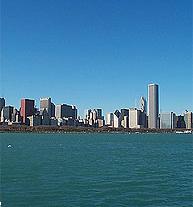How does it work?
Chicago has more than 50 large boilers that heat City buildings. To burn at peak capacity the boilers need the right combination of natural gas and ambient air, if they don’t have the right amount of oxygen they burn more natural gas. Studies show that the City’s boilers burn between 5% and 10% more natural gas than they would if they were burning at peak capacity.
The boiler tune-up program is two-phased.
1. Consulting engineers: Chicago brings in boiler engineers to make sure the boilers are operating at peak efficiency. They study the boiler and make any adjustments necessary. They also replace any old and worn out pieces of the boiler. The City has contracted engineers for the tune-up and installation phase, but the boilers will be maintained by City building engineers after installation of the monitor.
2. Installation of monitoring devises: The second phase is the installation of a combustion efficiency monitor that measures the amount of oxygen and natural gas coming in to the boiler. It constantly monitors the boiler to determine if it is burning at peak efficiency. The monitor sends out an alarm to the facilities’ engineer on his Blackberry when the boiler is not in peak condition.
Energy efficiency
On a Citywide basis, Chicago anticipates a natural gas consumption decrease of 5%, which is delivering an annual energy savings of 1.5 million therms, around $1.65 million annually.
One excellent example is the North Park Village - a 90-acre mixed use area owned by the City. Part Senior housing, part recreation area, and part protected wilderness, it is used for education and environmental research. Gas consumption in North Park Village was reduced by 12%, saving roughly $50,000 over the six-month heating period. This will be an annual recurring saving to the City budget.
Cost
Each boiler costs roughly $12,500 to tune-up and install the monitor.
Next steps
The City will be working with sister agencies, including the School Board, City Colleges, Chicago Transit Authority, and Chicago Parks District to help them tune-up and install monitors.
Application
1. Chicago collected its natural gas bills for each facility for a year and then analysed how much each boiler consumed.
2. City boiler engineers examined boilers to determine the most efficient operating parameters. The City suggests that if cities do not wish to install the continuous monitoring device, it is possible to tune the machines at least every year at beginning of heating season.



